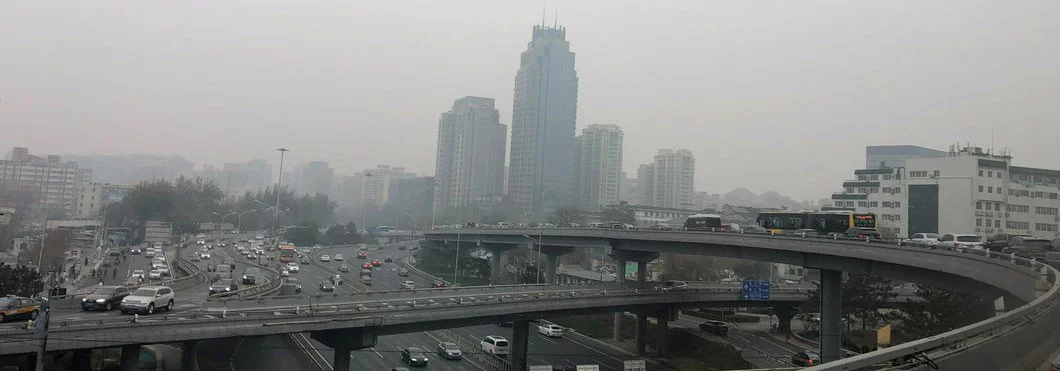The vision of the Aerosols and Health Group is to better understand the effect of air pollution on people's health and what role anthropogenic and natural emissions play now and in the future. While there are clear links between aerosol exposure and increased mortality and morbidity risk, little is known about how the properties of aerosols affect their toxicity and which emission sources are most important for human health.
Our mission is to quantify the aerosol sources and identify those most harmful to human health. To that end, we analyze aerosol archives with mass spectrometry and data mining techniques to identify aerosol sources around the world. Furthermore, we are interested in determining the role of particle sources, and thus their chemical and physical properties, in the harmfulness of particles to human health, both through emerging chemical metrics and on a population level. Moreover, we simulate air quality using our in-house model to describe the types of aerosols to which the population is exposed today and in a future shaped by emission reductions.
People
Recent Publications
-
Burgay F, Salionov D, Singer T, Eichler A, Brütsch S, Jenk TM, et al.
Nontarget screening of a Siberian ice core reveals changes in the pre-industrial to industrial organic aerosol composition
Science Advances. 2025; 11(4): eadr1923 (12 pp.). https://doi.org/10.1126/sciadv.adr1923
DORA PSI -
Dominutti PA, Jaffrezo JL, Marsal A, Mhadhbi T, Elazzouzi R, Rak C, et al.
An interlaboratory comparison to quantify oxidative potential measurement in aerosol particles: challenges and recommendations for harmonisation
Atmospheric Measurement Techniques. 2025; 18(1): 177-195. https://doi.org/10.5194/amt-18-177-2025
DORA PSI -
Dyonisius MN, Jenk TM
Ice core methods: studies of radiocarbon in ice
In: Elias S, ed. Encyclopedia of quaternary science. Ice core records. Oxford: Elsevier; 2025:206-220. https://doi.org/10.1016/B978-0-323-99931-1.00251-8
DORA PSI -
Heutte B, Bergner N, Angot H, Pernov JB, Dada L, Mirrielees JA, et al.
Observations of high-time-resolution and size-resolved aerosol chemical composition and microphysics in the central Arctic: implications for climate-relevant particle properties
Atmospheric Chemistry and Physics. 2025; 25(4): 2207-2241. https://doi.org/10.5194/acp-25-2207-2025
DORA PSI -
Navarro-Barboza H, Rovira J, Obiso V, Pozzer A, Via M, Alastuey A, et al.
Characterization of brown carbon absorption in different European environments through source contribution analysis
Atmospheric Chemistry and Physics. 2025; 25(4): 2667-2694. https://doi.org/10.5194/acp-25-2667-2025
DORA PSI -
Savadkoohi M, Gherras M, Favez O, Petit J-E, Rovira J, Chen GI, et al.
Addressing the advantages and limitations of using Aethalometer data to determine the optimal absorption Ångström exponents (AAEs) values for eBC source apportionment
Atmospheric Environment. 2025; 349: 121121 (14 pp.). https://doi.org/10.1016/j.atmosenv.2025.121121
DORA PSI -
Shukla AK, Tripathi SN, Talukdar S, Murari V, Gaddamidi S, Manousakas M-I, et al.
Measurement report: sources and meteorology influencing highly time-resolved PM 2.5 trace elements at three urban sites in the extremely polluted Indo-Gangetic Plain in India
Atmospheric Chemistry and Physics. 2025; 25(6): 3765-3784. https://doi.org/10.5194/acp-25-3765-2025
DORA PSI -
Strähl J, Lechleitner FA, Laemmel T, Geissbühler D, Salazar GA, Daellenbach KR, et al.
An improved setup for radiocarbon analysis of water-soluble organic carbon in environmental matrices
Radiocarbon. 2025; 67(1): 220-233. https://doi.org/10.1017/RDC.2024.113
DORA PSI -
Bhattu D, Tripathi SN, Bhowmik HS, Moschos V, Lee CP, Rauber M, et al.
Local incomplete combustion emissions define the PM2.5 oxidative potential in Northern India
Nature Communications. 2024; 15(1): 3517 (13 pp.). https://doi.org/10.1038/s41467-024-47785-5
DORA PSI -
Cheung RKY, Qi L, Manousakas MI, Puthussery JV, Zheng Y, Koenig TK, et al.
Major source categories of PM2.5 oxidative potential in wintertime Beijing and surroundings based on online dithiothreitol-based field measurements
Science of the Total Environment. 2024; 928: 172345 (14 pp.). https://doi.org/10.1016/j.scitotenv.2024.172345
DORA PSI -
Cui T, Manousakas MI, Wang Q, Uzu G, Hao Y, Khare P, et al.
Composition and sources of organic aerosol in two megacities in Western China using complementary mass spectrometric and statistical techniques
ACS ES&T Air. 2024; 1(9): 1053-1065. https://doi.org/10.1021/acsestair.4c00051
DORA PSI -
Daellenbach KR, Cai J, Hakala S, Dada L, Yan C, Du W, et al.
Substantial contribution of transported emissions to organic aerosol in Beijing
Nature Geoscience. 2024; 17(8): 747-754. https://doi.org/10.1038/s41561-024-01493-3
DORA PSI -
Decker ZCJ, Alpert PA, Ammann M, Anet JG, Bauer M, Cui T, et al.
Emission and formation of aircraft engine oil ultrafine particles
ACS ES&T Air. 2024; 1(12): 1662-1672. https://doi.org/10.1021/acsestair.4c00184
DORA PSI -
El Haddad I, Vienneau D, Daellenbach KR, Modini R, Slowik JG, Upadhyay A, et al.
Opinion: How will advances in aerosol science inform our understanding of the health impacts of outdoor particulate pollution?
Atmospheric Chemistry and Physics. 2024; 24(20): 11981-12011. https://doi.org/10.5194/acp-24-11981-2024
DORA PSI -
Graham AM, Pope RJ, Chipperfield MP, Dhomse SS, Pimlott M, Feng W, et al.
Quantifying effects of long-range transport of NO2 over Delhi using back trajectories and satellite data
Atmospheric Chemistry and Physics. 2024; 24(2): 789-806. https://doi.org/10.5194/acp-24-789-2024
DORA PSI -
Hobbie EA, Keel SG, Klein T, Rog I, Saurer M, Siegwolf R, et al.
Tracing the spatial extent and lag time of carbon transfer from Picea abies to ectomycorrhizal fungi differing in host type, taxonomy, or hyphal development
Fungal Ecology. 2024; 68: 101315 (8 pp.). https://doi.org/10.1016/j.funeco.2023.101315
DORA PSI -
Hobbie EA, Siegwolf R, Körner C, Steinmann K, Wilhelm M, Saurer M, et al.
Weather modifies the spatial extent of carbohydrate transfers from CO2-supplied broad-leaved trees to ectomycorrhizal fungi
Plant and Soil. 2024; 494: 717-730. https://doi.org/10.1007/s11104-023-06314-x
DORA PSI -
Kalberer M, Rothen-Rutishauser B, Daellenbach K, Sauvain JJ
Oxidative properties of atmospheric particles and their biological effects
Chimia. 2024; 78(11): 734-738. https://doi.org/10.2533/chimia.2024.734
DORA PSI -
Li X, Li H, Yao L, Stolzenburg D, Sarnela N, Vettikkat L, et al.
Over 20 years of observations in the boreal forest reveal a decreasing trend of atmospheric new particle formation
Boreal Environment Research. 2024; 29(1-6): 35-52.
DORA PSI -
Li K, Zhang J, Bell DM, Wang T, Lamkaddam H, Cui T, et al.
Uncovering the dominant contribution of intermediate volatility compounds in secondary organic aerosol formation from biomass-burning emissions
National Science Review. 2024; 11(3): nwae014 (9 pp.). https://doi.org/10.1093/nsr/nwae014
DORA PSI -
Ren J, Hao Y, Zheng X, Li X, Xie S
Ozone response to precursors changes in the Chengdu-Chongqing economic circle, China, from satellite and ground-based observations
Science of the Total Environment. 2024; 953: 176037 (11 pp.). https://doi.org/10.1016/j.scitotenv.2024.176037
DORA PSI -
Rusanen A, Björklund A, Manousakas MI, Jiang J, Kulmala MT, Puolamäki K, et al.
A novel probabilistic source apportionment approach: Bayesian auto-correlated matrix factorization
Atmospheric Measurement Techniques. 2024; 17(4): 1251-1277. https://doi.org/10.5194/amt-17-1251-2024
DORA PSI -
Skiba A, Styszko K, Tobler A, Casotto R, Gorczyca Z, Furman P, et al.
Source attribution of carbonaceous fraction of particulate matter in the urban atmosphere based on chemical and carbon isotope composition
Scientific Reports. 2024; 14(1): 7234 (14 pp.). https://doi.org/10.1038/s41598-024-57829-x
DORA PSI -
Treydte K, Liu L, Padrón RS, Martínez-Sancho E, Babst F, Frank DC, et al.
Recent human-induced atmospheric drying across Europe unprecedented in the last 400 years
Nature Geoscience. 2024; 17: 58-65. https://doi.org/10.1038/s41561-023-01335-8
DORA PSI -
Wang T, Li K, Bell DM, Zhang J, Cui T, Surdu M, et al.
Large contribution of in-cloud production of secondary organic aerosol from biomass burning emissions
npj Climate and Atmospheric Science. 2024; 7(1): 149 (9 pp.). https://doi.org/10.1038/s41612-024-00682-6
DORA PSI -
Zhang Y, Heikkinen L, Äijälä M, Peräkylä O, Graeffe F, Mickwitz V, et al.
Enhanced aerosol source identification by utilizing high molecular weight signals in aerosol mass spectra
ACS ES&T Air. 2024; 1(6): 502-510. https://doi.org/10.1021/acsestair.3c00102
DORA PSI -
Zheng F, Li J, Hua C, Xie J, Zhang Y, Li L, et al.
Dust event identification and characterization with one-year online observations in Beijing
Science of the Total Environment. 2024; 956: 177296 (14 pp.). https://doi.org/10.1016/j.scitotenv.2024.177296
DORA PSI -
Benedetti B, Tronconi A, Turrini F, Di Carro M, Donno D, Beccaro GL, et al.
Determination of polycyclic aromatic hydrocarbons in bud-derived supplements by magnetic molecular imprinted microparticles and GC-MS: D-optimal design for a fast method optimization
Scientific Reports. 2023; 13(1): 17544 (11 pp.). https://doi.org/10.1038/s41598-023-44398-8
DORA PSI -
Cai J, Daellenbach KR, Wu C, Zheng Y, Zheng F, Du W, et al.
Characterization of offline analysis of particulate matter with FIGAERO-CIMS
Atmospheric Measurement Techniques. 2023; 16(5): 1147-1165. https://doi.org/10.5194/amt-16-1147-2023
DORA PSI -
Casotto R, Skiba A, Rauber M, Strähl J, Tobler A, Bhattu D, et al.
Organic aerosol sources in Krakow, Poland, before implementation of a solid fuel residential heating ban
Science of the Total Environment. 2023; 855: 158655 (12 pp.). https://doi.org/10.1016/j.scitotenv.2022.158655
DORA PSI -
Chen Y, Shi Y, Ren J, You G, Zheng X, Liang Y, et al.
VOC species controlling O3 formation in ambient air and their sources in Kaifeng, China
Environmental Science and Pollution Research. 2023; 30(32): 75439-75453. https://doi.org/10.1007/s11356-023-27595-w
DORA PSI -
Dada L, Stolzenburg D, Simon M, Fischer L, Heinritzi M, Wang M, et al.
Role of sesquiterpenes in biogenic new particle formation
Science Advances. 2023; 9(36): eadi5297 (15 pp.). https://doi.org/10.1126/sciadv.adi5297
DORA PSI -
Daellenbach KR, Manousakas M, Jiang J, Cui T, Chen Y, El Haddad I, et al.
Organic aerosol sources in the Milan metropolitan area - receptor modelling based on field observations and air quality modelling
Atmospheric Environment. 2023; 307: 119799 (10 pp.). https://doi.org/10.1016/j.atmosenv.2023.119799
DORA PSI -
De Haan DO, Hawkins LN, Wickremasinghe PD, Andretta AD, Dignum JR, De Haan AC, et al.
Brown carbon from photo-oxidation of glyoxal and SO2 in aqueous aerosol
ACS Earth and Space Chemistry. 2023; 7(5): 1131-1140. https://doi.org/10.1021/acsearthspacechem.3c00035
DORA PSI -
Fang C, Haywood JM, Liang J, Johnson BT, Chen Y, Zhu B
Impacts of reducing scattering and absorbing aerosols on the temporal extent and intensity of South Asian summer monsoon and East Asian summer monsoon
Atmospheric Chemistry and Physics. 2023; 23(14): 8341-8368. https://doi.org/10.5194/acp-23-8341-2023
DORA PSI -
Heutte B, Bergner N, Beck I, Angot H, Dada L, Quéléver LLJ, et al.
Measurements of aerosol microphysical and chemical properties in the central Arctic atmosphere during MOSAiC
Scientific Data. 2023; 10(1): 690 (16 pp.). https://doi.org/10.1038/s41597-023-02586-1
DORA PSI -
Li L, Cao J, Hao Y
Spatial and species-specific responses of biogenic volatile organic compound (BVOC) emissions to elevated ozone from 2014–2020 in China
Science of the Total Environment. 2023; 868: 161636 (9 pp.). https://doi.org/10.1016/j.scitotenv.2023.161636
DORA PSI -
Maggi V, Salvatore MC, Casarotto C, Mangili C, Carton A, Baccolo G, et al.
Late Holocene evolution of the Adamello Glacier (Rhaetian Alps): new insights for alpine temperate glaciers
Geografia fisica e dinamica quaternaria. 2023; 46(1-2): 193-210. https://doi.org/10.4454/1312gf6j
DORA PSI -
Mishra S, Tripathi SN, Kanawade VP, Haslett SL, Dada L, Ciarelli G, et al.
Rapid night-time nanoparticle growth in Delhi driven by biomass-burning emissions
Nature Geoscience. 2023; 16(3): 224-230. https://doi.org/10.1038/s41561-023-01138-x
DORA PSI -
Mogno C, Palmer PI, Marvin MR, Sharma S, Chen Y, Wild O
Road transport impact on PM2.5 pollution over Delhi during the post-monsoon season
Atmospheric Environment: X. 2023; 17: 100200 (11 pp.). https://doi.org/10.1016/j.aeaoa.2022.100200
DORA PSI -
Siegwolf RTW, Lehmann MM, Goldsmith GR, Churakova OV, Mirande-Ney C, Timoveeva G, et al.
Updating the dual C and O isotope - gas-exchange model: a concept to understand plant responses to the environment and its implications for tree rings
Plant, Cell and Environment. 2023; 46(9): 2606-2627. https://doi.org/10.1111/pce.14630
DORA PSI -
Wang J, Wang S, Xu X, Li X, He P, Qiao Y, et al.
The diminishing effects of winter heating on air quality in northern China
Journal of Environmental Management. 2023; 325: 116536 (12 pp.). https://doi.org/10.1016/j.jenvman.2022.116536
DORA PSI -
Zhang J, Li K, Wang T, Gammelsæter E, Cheung RKY, Surdu M, et al.
Bulk and molecular-level composition of primary organic aerosol from wood, straw, cow dung, and plastic burning
Atmospheric Chemistry and Physics. 2023; 23(22): 14561-14576. https://doi.org/10.5194/acp-23-14561-2023
DORA PSI -
Zhang Y, Tian J, Wang Q, Qi L, Manousakas MI, Han Y, et al.
High-time-resolution chemical composition and source apportionment of PM2.5 in northern Chinese cities: implications for policy
Atmospheric Chemistry and Physics. 2023; 23(16): 9455-9471. https://doi.org/10.5194/acp-23-9455-2023
DORA PSI -
in 't Veld M, Khare P, Hao Y, Reche C, Pérez N, Alastuey A, et al.
Characterizing the sources of ambient PM10 organic aerosol in urban and rural Catalonia, Spain
Science of the Total Environment. 2023; 902: 166440 (13 pp.). https://doi.org/10.1016/j.scitotenv.2023.166440
DORA PSI








